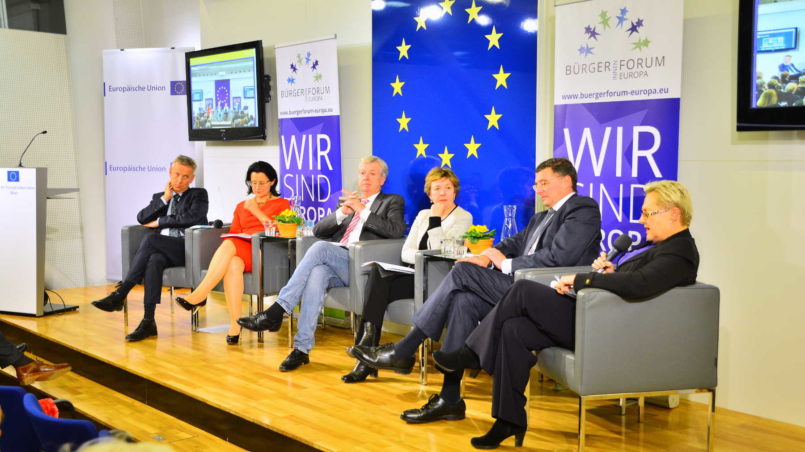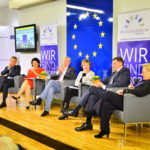Euro-Scepticism and Nationalism – What can the European Parliament Do about it?

Event data
- Datum
- 31. 1. 2018
- Host
- Bürgerforum Europa
- Location
- House of the European Union, Vienna
- Event-type
- panel discussion
- Participants
- Verica Trestenjak, Professor for European law, University of Vienna, Austria, former Advocate General at the European Court of Justice
- Heidi Glück, Communication expert, former speaker of Austrian cancellor Wolfgang Schüssel
- Jörg Leichtfried, Member of Austrian parliament for Austrian socialist party SPÖ, former member of European Parliament
- Reinhold Lopatka, Member of Austrian parliament for Austrian conservative party ÖVP
- Sonja Puntscher-Riekmann, Professor for European law, University of Salzburg, Austria
- Dr. Roland Adrowitzer, Journalist at Austrian television company ORF, presentation
On 31 January 2017, the “Citizens’ Forum Europe” took place at the House of the European Union in Vienna. Under the title “The European Democracy – Limits and Possibilities of the European Parliament“, the discussion with top-class speakers discussed the importance of the European Parliament in this day and age.
The expert for European law, Sonja Puntscher-Riekmann, reported in her opening statement that the European Parliament has experienced “sensational milestones” since its foundation in the 1970s, such as the introduction of direct elections or the constant expansion of its right of co-determination up to ordinary legislative procedures. Therefore, it is not so much the Parliament that needs to be reformed, but the informal structure as a whole. However, there is certainly justified criticism of the European Parliament, such as “conspicuous gaps” in the powers of the European Parliament. However, everything is often dealt with in the light of national interests, and it is difficult for candidates to float European issues in their home countries at all. The low turnout in the elections to the European Parliament is also a problem because it is constantly and in almost all countries much lower than in the national elections.
Jörg Leichtfried, a long-time Member of the European Parliament for the Austrian socialist party, SPÖ, began with an optimistic approach, considering European politics very positively. “This European Parliament is one of the most fascinating parliaments in the world.” It is very often perceived by the public as being below its true value. The Treaty of Lisbon and the implementation of the principle of the top candidate countries were major steps forward because Parliament’s involvement gave foreign trade policy a whole new meaning and enabled it to improve its position vis-à-vis the Commission and the Member States.
Leichtfried, however, finds it important not to exclude opponents:”In my opinion, it is now a matter of bridging this gap.” The European Parliament is the most appropriate institution at European level to repress this nationalism. Leichtfried wants to see more powers for the European Parliament as a solution to the problem of Euro-scepticism and a weakening of the ability of the nation states to block joint projects.
Verica Trestenjak, lawyer and former Advocate General at the European Court of Justice, responded to the question of how to deal with states that actively work against the interests of Europe:
There is actually no effective sanctions procedure for dealing with countries that do not respect European values.
For example, unanimity is required for a procedure under Article 7 and the European Court of Justice does not have any really effective sanctions. It would be helpful to change this: “We need effective legal protection with which the European Court of Justice can also impose financial sanctions”.
Reinhold Lopatka, the European spokesman for the Austrian People’s Party, spoke in particular of the refugee crisis – with a pessimistic undertone:“Everything we are accustomed to in the rule of law no longer works”, according to Lopatka. The greatest current problem of the EU is Brexit, i.e. the withdrawal of Britain, which weakens the EU enormously because Britain is a very important member of the EU. In Lopatka’s opinion, the refugee crisis was an important reason for Brexit: He said he was “absolutely certain” that the Brexit vote would have turned out differently without the refugee crisis.
The European project should not, however, become a project of the elites. “If Europe wants to develop positively, we must not focus on the European institutions but must think from the bottom up.” The European project is too top-heavy and must be thought of more from the lower political level, i. e. the municipalities. In order to overcome the Euro-scepticism of the population, however, he believes that it is necessary to involve the nation states more closely and that Europe’s skeptical states such as Poland and Hungary must not be left out of the equation: “I consider it a very very important task to bring them back.”
Communication expert, Heidi Glück, also fears that Europe will be perceived as an elite project because the citizens have not yet received enough. She sees a solution in communication:“European policy needs staging, but in a positive sense.”
Sonja Puntscher-Riekmann confirmed that there are widespread doubts among the population about the rationality of Europe and that a debate on this is urgently needed. However, she does not see the European institutions as having a duty:“It is the task of national governments to mediate Europe”. Politicians always celebrate themselves as heroes of democracy to their own people, using the complexity of the EU as an excuse for non-communication.
Verica Trestenjak complained that EU case law is often not accepted by the member states. The states only want to be members of the EU if it brings them advantages, but they do not accept the disadvantages. She pointed out that the EU’s opponents, in particular, had taken part in the Brexit vote, while its supporters stayed at home.
Jörg Leichtfried also confirmed that the EU must find better acceptance among its citizens. At the moment, passionate European policy is only being pursued by its opponents, the supporters have nothing against it. The governments of all European member states would not fight for Europe, including all Austrian governments since Austria’s accession. Similar to Heidi Glück, he sees a problem with communication: This is too distant, the whole language “one for specialists”.
All in all, the participants agreed that the European Union should be judged very positively and that the European Parliament plays an important role. However, there also seemed to be widespread agreement on the fact that these advantages are not communicated to citizens. Elegant language leads to the EU being perceived as an elite project, while the instrumentalisation of the political profiling of individual politicians at the national level promotes widespread Euro-scepticism.
Credits
| Image | Title | Author | License |
|---|---|---|---|
 |
Euro-Scepticism and Nationalism – What can the European Parliament Do about it? | Julia Hahn | With kind permission of Bürgerforum Europa |
